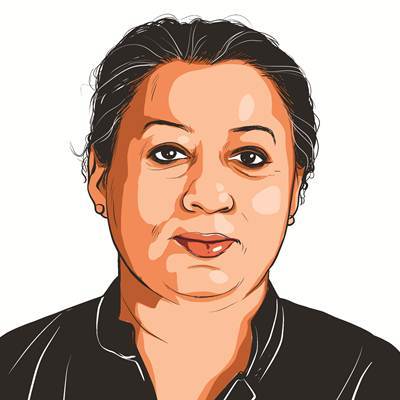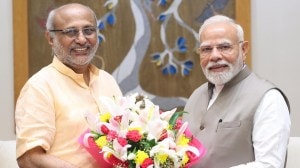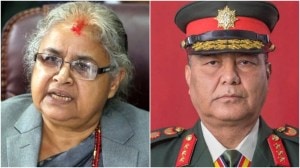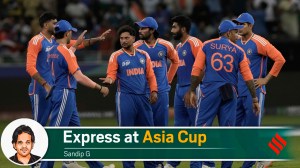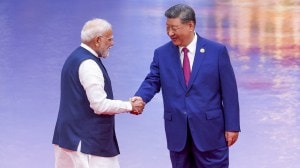Ritu Sarin is Executive Editor (News and Investigations) at The Indian Express group. Her areas of specialisation include internal security, money laundering and corruption. Sarin is one of India’s most renowned reporters and has a career in journalism of over four decades. She is a member of the International Consortium of Investigative Journalists (ICIJ) since 1999 and since early 2023, a member of its Board of Directors. She has also been a founder member of the ICIJ Network Committee (INC). She has, to begin with, alone, and later led teams which have worked on ICIJ’s Offshore Leaks, Swiss Leaks, the Pulitzer Prize winning Panama Papers, Paradise Papers, Implant Files, Fincen Files, Pandora Papers, the Uber Files and Deforestation Inc. She has conducted investigative journalism workshops and addressed investigative journalism conferences with a specialisation on collaborative journalism in several countries. ... Read More
Ex-Cab Sec kicks up dust in power corridors
K R Narayanan fought to have Air India planes at his disposal for foreign tours. H D Deve Gowda was wary of his sons. Ram Vilas Paswan treat...

K R Narayanan fought to have Air India planes at his disposal for foreign tours. H D Deve Gowda was wary of his sons. Ram Vilas Paswan treated Railways as nothing more than a gravy train.
This and more is what former cabinet secretary T S R Subramanian writes in his just released book, Journey’s through Babudom and Netaland.
For those in high places, a thin line separates official secrets and South Block gossip. And Subramanian, who was cabinet secretary during the tenure of Dewa Gowda and I K Gujral (and for a fortnight during Atal Behari Vajpayee’s time in 1998) has dared to bare a lot about the goings-on in the corridors of power while walking the tightrope.
He has taken potshots at prime ministers, ministers and bureaucrats, penned a scathing attack on the CBI and admitted that the office of the Cabinet Secretary stands undermined.
‘‘These are my deliberate thoughts after spending four decades in government, and not casual notings,’’ Subramanian told The Indian Express. ‘‘I am free to speak my line and the people have a right to know how the Government functions.’’
Perhaps the most interesting anecdote in the book recounts former President Narayanan’s request for Air India planes during his twin foreign tour in 1997. The request, Subramanian narrates, led to a ‘‘dogfight’’ in Rashtrapati Bhavan since he and Civil Aviation Secretary M K Kaw politely told the President how providing him the planes would be violation of a Cabinet order.
Eventually, he claims, an angry Narayanan spoke to then prime minister Gujral and got the planes sanctioned. The incident is thus summed up: ‘‘That was how the two identified planes were placed at the disposal of Rashtrapati Bhavan, in public interest. That was how also, I was never invited to any Rashtrapati Bhavan function (thereafter).’’
While this anecdote is amusing, others are revealing. Sample these, described in the last chapters:
• On Deve Gowda: ‘‘On the day I took charge as cabinet secretary, he told me: ‘My sons and my relatives will want to exploit my present position to their pecuniary advantage. They will use their proximity to me, through open and subtle ways, to influence you, and to put pressure on you. I want you to be completely fair and impartial and not oblige them’.’’
• On Ram Vilas Paswan: ‘‘(The former railway minister) blithely promoted a large number of new railway lines all over India, mostly in Bihar… He insisted that token funds should be allocated, to enable him to make populist announcements at various locations, promising manna from the heavens.’’
• On ministers: ‘‘Very few, if any, of the ministers had any interest in developmental matters or economic or social transformation of India…Their interest was only in their own future in public life aside from feathering their own nest.’’
• On an unnamed minister: ‘‘One minister was bluntly overruling his department to distribute favours, certainly for his own personal advantage…Using an obscure provision of the rule of business, the Cabinet Secretary summoned the file from the department, and wrote a note for the Prime Minister requesting him to formally overrule the Minister, in the Ministry’s own file. This was a rare event indeed, I do not know of any precedent.’’
• On CBI: ‘‘No CBI Director in recent times has cared a fig for that department. He usually found an informal nexus with the Prime Minister of the day… It was but natural that the lower functionaries of the CBI could find and exploit lucrative routes while pursuing their investigations.’’
• On Cabinet Secretary’s post: ‘‘I believe the Principal Secretary (Brajesh Mishra) has fully overshadowed the role of the Cabinet Secretary and has become the dominant power centre in India…Brajesh Mishra’s own domestic administrative experience in India is scanty.’’
• On oath of secrecy: ‘‘I wish to be given one rupee (for) each time this (secracy) oath is violated by a minister. I would soon be the richest man in India…Many Ministers routuinely show the noting of the Secretariat, opposing a particular proposal, to the private party directly concerned.’’
• On redtapism: ‘‘Various junior officials, including those from the Finance Ministry, saw it as a game to constantly throw a spanner in the works, to impede any forward movement. One officer whom on first sight at a coordination meeting I valued as worth a billion dollars. Towards the end of my tenure, I found that he was in fact worth five billion dollars!’’
Besides this, Subramanian’s book talks about his tenure as a junior bureaucrat in Kanpur and his years as chief secretary in Uttar Pradesh, where he says he had a tough time holding his own on the subject of transfers and postings. Subramanian’s final observation: ‘‘I have watched innumerable officials compromise themselves and bend over backwards to oblige their political masters, only to be unceremoniously cast aside. It is not as if the category of honest and forthright civil servants does not exist, but they are being sidelined.’’
Photos



- 01
- 02
- 03
- 04
- 05

